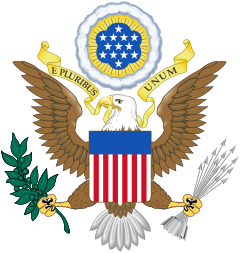Postal Clause
Article I, Section 8, Clause 7 of the United States Constitution, known as the Postal Clause or the Postal Power, empowers Congress "To establish Post Offices and Post Roads." The Post Office has the constitutional authority to designate mail routes. The Post Office is also empowered to construct or designate post offices with the implied authority to carry, deliver, and regulate the mail of the United States as a whole. The Postal Power also includes the power to designate certain materials as non-mailable, and to pass statutes criminalizing abuses of the postal system (such as mail fraud and armed robbery of post offices)[1]
| This article is part of a series on the |
| Constitution of the United States |
|---|
 |
| Preamble and Articles |
| Amendments to the Constitution |
|
|
| Unratified Amendments |
| History |
| Full text |
|
History
The Postal Clause was added to the Constitution to facilitate interstate communication as well as to create a source of revenue for the early United States.[2][3] There were some early disagreements as to the boundaries of the Postal Power. John Jay, in a letter to George Washington, opined that the postal service should not be burdened with the responsibility for handling newspaper delivery, and also suggested that the Post Office be placed under the supervision of the executive branch (a suggestion which later led to the creation of the Post Office Department).[4] Thomas Jefferson feared that the postal service would become a source of patronage and a waste of money. Jefferson also expressed doubt at granting Congress the power to designate post roads, as he considered road building to be a state responsibility.[5]
Interpretation
The Clause has been construed to give Congress the enumerated power to designate mail routes and construct or designate post offices, with the implied authority to carry, deliver, and regulate the mail of the United States as a whole. An early controversy was whether Congress had the power to actually build post roads and post offices, or merely designate which lands and roads were to be used for this purpose, and to what extent that power could be delegated to the Postmaster General.[6] The U.S. Supreme Court construed the power narrowly during the early part of the 19th century, holding that the power consisted mostly for the designation of roads and sites, but gradually gave way later on allowing appropriation of land for postal purposes.[7]
The Postal Power also includes the power to designate certain materials as non-mailable, and to pass statutes criminalizing abuses of the postal system (such as mail fraud and armed robbery of post offices).[8] This power has been used by Congress and the Postmaster General to exclude obscene materials from the mail, beginning with an act in 1872 to ban lottery circulars from the mail, as well as the Comstock laws in 1873.[7][8] These attempts at limiting the content of the mail were upheld by the Supreme Court, but in the 20th century, the Court took a more assertive approach in striking down postal laws which limited free expression, particularly as it related to political materials.[7][8] The First Amendment thus provided a check on the Postal Power.
References
- "The Constitution of the United States: A Transcription". Archives.gov. National Archives and Records Administration. Retrieved August 16, 2020.
- "Article 1, Section 8, Clause 7: Records of the Federal Convention". press-pubs.uchicago.edu.
- "Article 1, Section 8, Clause 7: St. George Tucker, Blackstone's Commentaries 1:App. 264--65". press-pubs.uchicago.edu.
- "Article 1, Section 8, Clause 7: John Jay to George Washington". press-pubs.uchicago.edu.
- "Article 1, Section 8, Clause 7: Thomas Jefferson to James Madison". press-pubs.uchicago.edu.
- "Article 1, Section 8, Clause 7: House of Representatives, Post Office Bill". press-pubs.uchicago.edu.
- Analysis and Interpretation of the U.S. Constitution, from the Congressional Research Service of the Library of Congress (hosted by Justia.com)
- Hall, Kermit L., ed. (2005). The Oxford Companion to the Supreme Court of the United States (Second ed.). Oxford University Press. pp. 765–766. ISBN 0-19-511883-9.